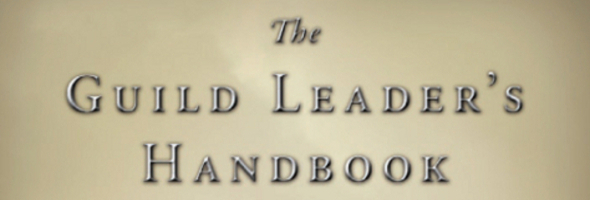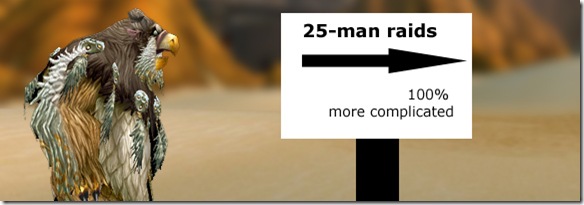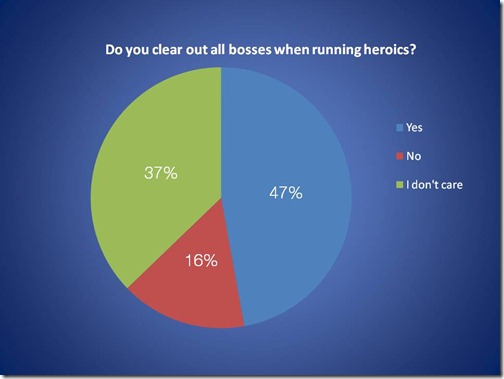There is a book for everything it seems. Some will tell you how to hack an iPhone, others will tell you how to cook rare and exotic treats. In the gaming world there has been everything from strategy and content guides to art books and everything in between.
A few weeks ago a new book hit the stands, The Guild Leader’s Handbook by Scott F. Andrews. Scott is not only an accomplished and long time guild leader in World of Warcraft, but also the author of “Officers’ Quarters” on wow.com. His book takes a look at what it is to run a guild in today’s modern MMOs and offers readers both looking to start a guild and those who have been at it a while, a cornucopia of information from his collected experiences. Today I’d like to share my thoughts on the book with you.
Before we begin I’d like to make a few things clear. Firstly, Yes I do write for wow.com as one of the class columnists. This does not mean however that I will be unfairly biased towards the book. I have had little to no interaction with Scott and anyone who knows me or has listened to my podcast knows that I do not temper my criticism and critiques based on acquaintances or tangential relations. In short, friend or foe I try to tell it exactly as it is and as unbiased as possible. In mathematical terms we would call this “Correlation does not imply causation”. Secondly, while I myself am not currently a Guild Leader in WoW, I have lead numerous successful guilds, super-groups, and various other groupings in many other games. I am however still the Healing Lead and one of the raid officers for the guild I call home, and thus in a leadership position within the structure.
The first thing I noticed when opening this book, is the level of accessibility. It was very well written and very easy not only to read but digest. The concepts and ideas in the book are thoughtfully laid out and the way the topics are grouped not only make sense logically, but allow the material to be more easily digested. Potentially confusing concepts are quickly explained, often times with a real life scenario that the author has experienced himself. The second thing I noticed while reading this book is the confirmation of the author’s depth of experience. The familiarity he writes about the topics is comforting and also conveys a sense of certainty that is easily lost when writing something of this nature.
The book itself covers many topics such as;
- Forming a guild and making it successful
- Choosing a guild size and focus
- Dealing with guild drama
- Differences between leading a guild and leading a raid
- Loot distribution
- Alternate styles of guilds (PvP, RP)
- Choosing officers
- Guild Morale
- Planning for the long term
- Dealing with Real Life
Seems like a lot to cover in such a small book doesn’t it? It is, but the author cuts out most of the unnecessary and leaves in the most relevant information to the topic. Each topic is subdivided and dives into specifics and does so with the perfect amount of detail.
There were a few pieces that really stood out to me while reading this. First was the section on forming a guild. Beyond setting a size and focus for your guild, the author talked about a topic that I think deserves some attention. Forming a guild identity and presence. For any established guild or group, their name and longevity carry a certain weight to them. If you think about any guilds, corps or fellowships you may have come across, I’m certain you can find at least one where their name is well known. For a new guild starting out it can be hard to forge an identity and establish a presence. The author offers some solid advice for creating a server presence. This ranges from specializing and becoming rock solid at a particular goal, having a history of cooperation with other people and guilds to having fun contests and events. One example that I found particularly enjoyable was the idea of taking a completely meaningless piece of land in the game and claiming it as your own, while challenging anyone to take it from you and doing anything you can to hold on to it. That would certain generate some notice, and could be a particularly fun event.
Next was explaining the differences between leading a guild, and leading a raid. The distinction is one that sometimes goes unnoticed. A lot of players seem to feel the two are always synonymous. The author explains the characteristics of a guild leader very well and talks about the shift in personae needed to lead a raid. The two can often times be polar opposites of each other. A guild leader is at the end of the night the ultimate authority of a guild. They can control who becomes officers, who is kicked or invited and tend to be looked upon as the arbiters for any guild disputes. Compassion, openness, friendliness and approachability all play very well to a guild leaders station. A raid leader has to evaluate performances constantly while keeping the group focused. They have to play the role of team captain, coach and player all at the same time. Leading by example, but also calling out problems and fixing issues as quickly as possible. This can sometimes involve not being very nice and squishy in your assessments. I was quite pleased to read this section here and it would be something I encourage not only people in leadership roles to read, but also those in a raider position. It is very much like being friends with your boss outside of work. When you’re at work you still need to work, and it’s your bosses job to keep you focused.
Another part that particularly stuck out to me was the section detailing real life interactions and issues. Even though this is a game, it is a social network. You are interacting with other players regularly, and you are devoting time out of real life to play this game with other people. As a result real life will always impact a gamers life and a game may affect the life of those that play it. This section of the book covers topics like dealing with addictions (both substance and potential video game addiction), Depression and mental illness, sexual predators, relationship problems, family problems, burnout and criminal confessions. These are real life topics that can and do affect people who play MMOs. This section offers advice to deal with these situations as they arise. Let’s not forget it wasn’t so long ago that a criminal was tracked down through WoW by law enforcement.
This section also talks about planning real life meet-ups. Investing as much time as you do in a guild there may come a time where you want to meet the people behind the avatars face to face. It sometimes requires a lot of planning, but can indeed be exceptionally rewarding.
So in the end what does this book really have to offer?
For the new guild leader or leadership role
A plethora of information that is neatly gathered in one place for you. There is a lot that goes into forming and running a guild. This book takes the information and neatly bundles it for you for easy consumption. The information contained in the book is very accurate, and is very universal in it’s approach. The advice offered is solid, well thought out and has been tried and tested by the author himself. The book may have items you never thought to consider, or just did not occur to you. It offers a new officer or guild leader a chance to be prepared and also educates you on exactly what you can expect. Everything from personalities in the guild and group dynamics to planning for the future and longevity of your guild. All the basics you could possibly need to know are detailed here for you.
For the old-hand
Even if you have been playing MMOs for a long time and are quite experienced at leading groups, running guilds and leading raids, this book will offer something that can often times be lost over time. Perspective. We fill these rolls for so long that things become second nature to us. Like everything sometimes it’s nice to have a refresher. No one is perfect 100% of the time, we all make mistakes or forget things. The way I view it is like this. Next to my computer I have a series of books for programming, APA style and formatting guides, marketing and business books and a variety of other reference material. No matter how long I’ve been doing something, there will be things that I will forget. Having these books handy gives me a reference. somewhere I can go to clarify questions and vague points or remind myself of things I may have forgotten. This book now has a permanent place on that shelf. For us old hands this book is a perfect reference to when we need to get back down to basics.
For the non leader
Even if you are not in a leadership role this book can offer you a great insight you might not have otherwise. Ever wonder why your guild leader made a particular decision but don’t really want to ask them? How about when a raid leader does something that you’re not quite sure of? This book will give you a basic understanding of what it is your guild’s leadership has to go through and constantly juggle to make sure the group remains stable and that you have a place you can unwind and have fun.
I applaud the author for this book. I found it easily accessible, accurate and a fantastic read. I was able to identify with the examples he presented right away and could have compared them to any number of stories from my own past in gaming. This book is a great starting point for anyone looking for form a guild, new to an officer position or for those who just want to understand what happens behind the scenes of their groups. On a personal level, reading this book allowed me to catch something happening in my very own guild that I almost missed simply by reading about it and being reminded of it.
The only criticism of it I have is that I feel it could have been longer. Some of the sections could have been more fully explored and may have benefited from having a little more room to breathe. The book ends at a surprisingly short186 pages.
I feel it is well written, logically put together and is a must read for anyone seriously involved in MMOs and guild structure. Even with consideration of the length I feel that is well worth the money, and even more worth the time you would invest reading it.
The book retails for $24.95 us ($31.95 CDN) and can be purchased directly through the publisher’s website.
If you’ve read it and would like to share your thoughts on it we’d love to hear your opinion on it.
![]()




